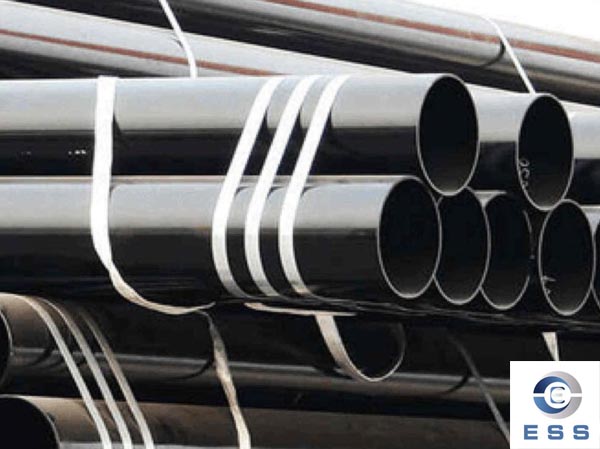In steel pipe manufacturing, ERW steel pipe and seamless black steel pipe are the two most common types of steel pipe. Although they appear similar, they differ significantly in manufacturing processes, performance, applications, and cost. Understanding the differences between the two will help you select the most appropriate steel pipe during engineering design and project procurement.

What is ERW Steel Pipe?
Electric Resistance Welded (ERW) steel pipe
is formed by rolling steel and then welding it longitudinally along its length.
Therefore, ERW steel pipe has a welded joint along its cross section.
1. Manufacturing Standards
Common standards include ASTM A500, A53, EN
10217, and GB/T 3091.
2. Length and Size
Common factory lengths are 6m or 12m, with
wall thicknesses typically ranging from 1.0mm to 25mm.
3. Surface Treatment
Common options include black, galvanized,
and epoxy-coated.
What is Seamless Black Steel Pipe?
Seamless black steel pipe is a hollow steel
pipe made directly from a billet through piercing, hot rolling, or cold
drawing, without welds. Seamless
pipe is produced by extruding the metal to the desired length.
Therefore, it has no joints along its entire cross-section.
1. Manufacturing Standards
Common standards include ASTM A106, ASTM A53,
API 5L, EN
10210, and GB/T 8163.
2. Production Process
Hot-rolled
seamless pipe: Pierced, rolled, and sized at
high temperatures. Suitable for thick-walled or large-diameter pipes.
Cold-drawn seamless pipe: Cold-worked to
achieve higher dimensional accuracy and better surface quality, it is commonly
used in machining and hydraulic systems.
3. Definition of "Black Steel
Pipe"
This refers to ordinary carbon steel pipe
without galvanizing or coating, and has a black oxide scale.
Comparing ERW and Seamless Black Steel
Pipe
1. Manufacturing Process Comparison
ERW Steel Pipe: Made from steel strips
through high-frequency electric resistance welding, with longitudinal welds.
Seamless Black Steel Pipe: Made from a
single steel billet through perforation and rolling, with no welds.
2. Dimensional Accuracy Comparison
ERW Steel Pipe: High dimensional accuracy
and good roundness.
Seamless Black Steel Pipe: Hot-rolled pipes
have lower accuracy, while cold-drawn pipes have higher accuracy.
3. Strength and Performance Comparison
ERW Steel Pipe: Weld strength is slightly
lower than the parent material.
Seamless Black Steel Pipe: Uniform overall
strength and strong pressure resistance.
4. Pressure Capacity Comparison
ERW Steel Pipe: Suitable for medium and
low-pressure fluid transportation (≤7 MPa).
Seamless Black Steel Pipe: Can withstand
high-pressure and high-temperature environments.
6. Appearance and Wall Thickness Comparison
ERW Steel Pipe: Uniform wall thickness,
smooth appearance.
Seamless Black Steel Pipe: Variable wall
thickness, with a high surface scale.
7. Cost Comparison
ERW Steel Pipe: Low cost, high production
efficiency.
Seamless Black Steel Pipe: Higher cost,
long production cycle.
8. Application Comparison
ERW Steel Pipe: Suitable for water pipes,
gas pipes, structural pipes, and automotive pipes.
Seamless Black Steel Pipe: Suitable for
boiler pipes, oil pipelines, hydraulic systems, and high-pressure equipment.
ERW Steel Pipe vs. Seamless Black Steel
Pipe: How to Choose
When high strength, high temperature and
high pressure resistance, or critical process applications are required,
seamless black steel pipe is preferred.
When projects prioritize cost-effectiveness
and production efficiency, ERW steel pipe is a good choice.
For structural applications (such as steel
structures and building supports), ERW steel pipe is an ideal choice.
Summary
Although both ERW steel pipes and seamless
black steel pipes play an important role in social construction, ERW steel
pipes and seamless black steel pipes have different appearances, uses, and
manufacturing processes.
Read more: Mild Steel Pipe VS. Carbon Steel Pipe or ERW Pipe Specifications and Models













 Eastern Steel Manufacturing Co.,Ltd not only improve product production and sales services, but also provide additional value-added services. As long as you need, we can complete your specific needs together.
Eastern Steel Manufacturing Co.,Ltd not only improve product production and sales services, but also provide additional value-added services. As long as you need, we can complete your specific needs together.










